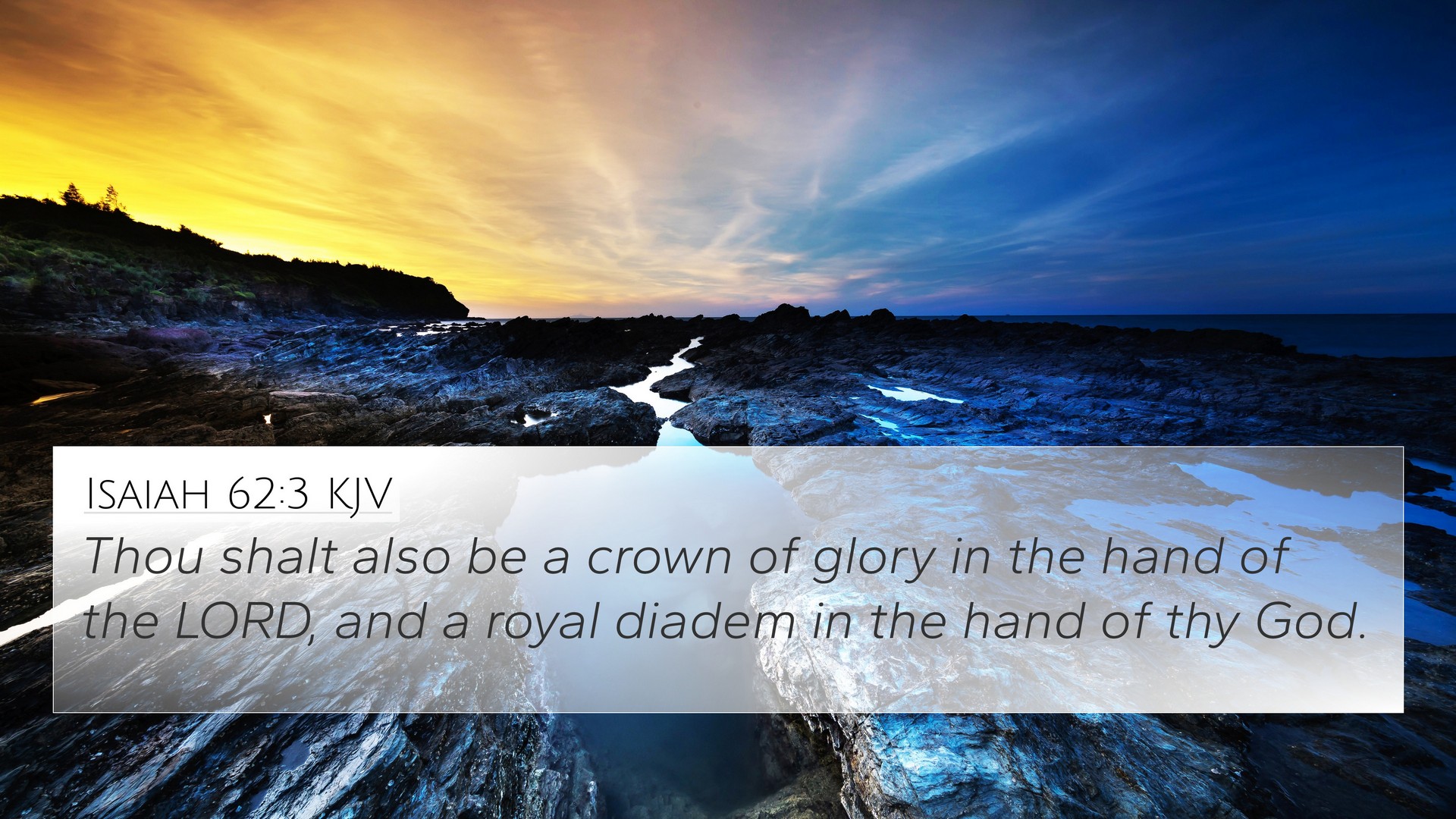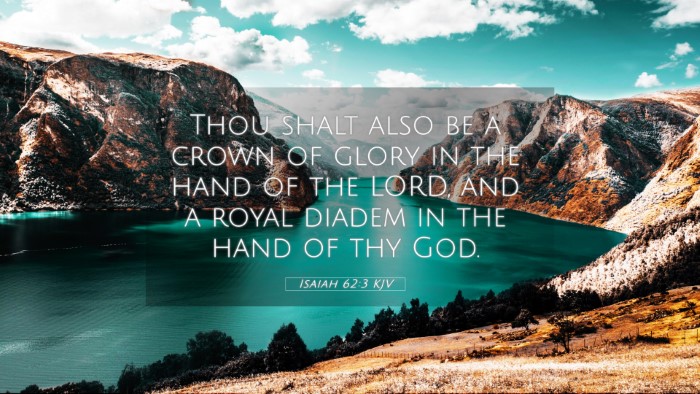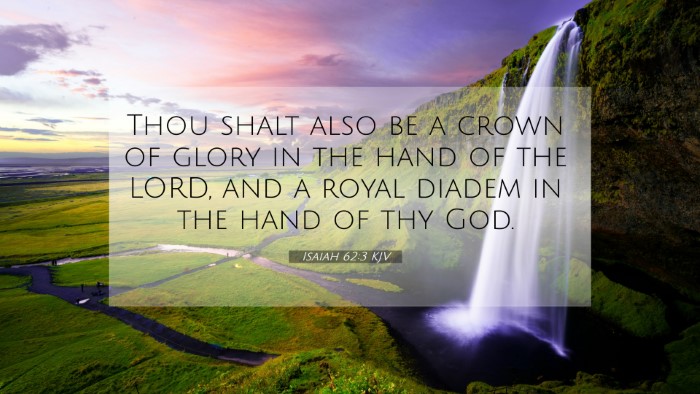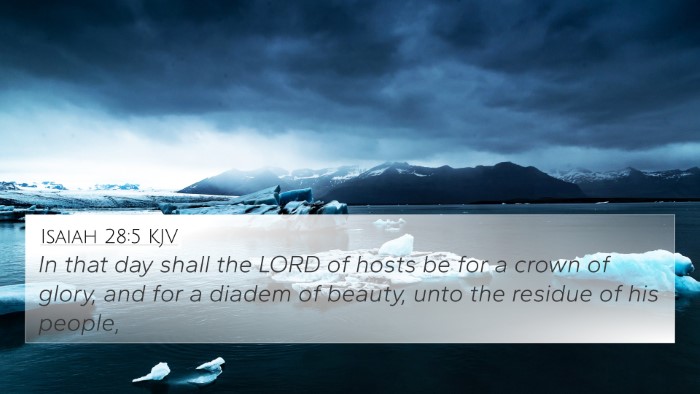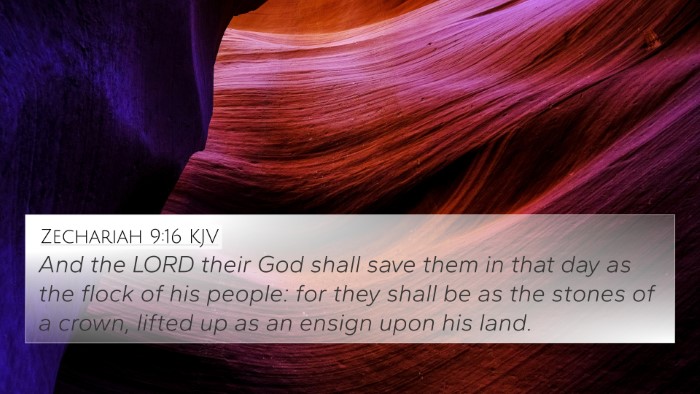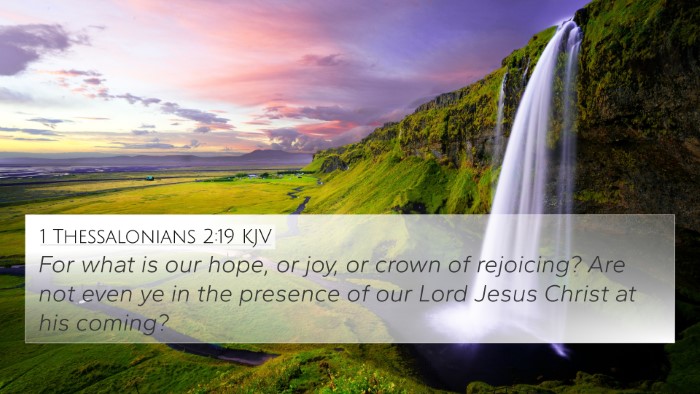Understanding Isaiah 62:3
Isaiah 62:3 states, "You shall be a crown of glory in the hand of the Lord, and a royal diadem in the hand of your God." This verse is rich with meaning and symbolism, embodying themes of honor, divine favor, and the restoration of God's people. The insights drawn from public domain commentaries, such as those by Matthew Henry, Albert Barnes, and Adam Clarke, illuminate the spiritual significance inherent in this verse.
Meaning and Interpretation
Isaiah 62:3 presents a transformative promise to God's people, identifying them as a "crown of glory" and a "royal diadem." This scripture emphasizes God's personal engagement with His people, promising a restoration that elevates them to a status of value and distinction.
Key Themes
- Divine Favor: The verse indicates a special status granted by God, akin to royalty, showcasing the honor He bestows upon His people.
- Restoration and Hope: It signifies not just restoration, but a celebratory transformation from disgrace to honor.
- The Role of God’s People: It reflects the responsibility and role that the faithful must embody as representatives of God on Earth.
Insights from Commentaries
Various commentaries provide profound insights into this verse:
-
Matthew Henry:
Henry describes this promise as an assurance of glory for those who are called by God, emphasizing God's protective and glorious hold over His people.
-
Albert Barnes:
Barnes highlights the metaphor of a crown, suggesting that God's people are adornments in His sight, reflecting their importance and the dignity God grants them.
-
Adam Clarke:
Clarke posits that the imagery used in this verse serves to rally the people's spirits, reminding them of their elevated position and the hope they hold for the future.
Bible Cross-References
Isaiah 62:3 has several connections to other scriptures that enhance its meaning:
- 1 Peter 2:9: "But you are a chosen race, a royal priesthood, a holy nation." This emphasizes the divine calling and honor bestowed upon believers.
- Revelation 2:10: "Be faithful unto death, and I will give you the crown of life." This connects the idea of crowns to faithfulness and eternal reward.
- Psalm 149:4: "For the Lord takes pleasure in his people; he adorns the humble with salvation." Here, God's joy in His people reflects their valued status.
- Isaiah 61:10: "I will greatly rejoice in the Lord; my soul shall exult in my God, for he has clothed me with the garments of salvation." This reinforces the theme of restoration.
- 2 Corinthians 3:2-3: "You are our letter, written in our hearts, known and read by everyone." This indicates that believers represent God's work in the world.
- Isaiah 43:4: "Since you are precious in my eyes, and honored, and I love you." This illustrates God’s personal affection for His people.
- Hebrews 2:10: "For it was fitting that he, for whom and by whom all things exist, in bringing many sons to glory..." This emphasizes the glory God plans to share with His people.
Thematic Connections
The themes of Isaiah 62:3 resonate through the entire canon of scripture. It prompts readers to explore the continuity of God’s promises across the Old and New Testaments. The notion of believers as royalty persists through Pauline theology, as seen in Romans 8:17, where it states, "and if children, then heirs—heirs of God and fellow heirs with Christ." This connection encourages deeper study into how prophecies align with the message of the New Testament and the experience of the early Church.
Cross-Referencing in Bible Study
Understanding how to use Bible cross-references enhances the study of this verse. Utilizing tools like a Bible concordance and a Bible cross-reference guide can find connections that enrich comprehension. For example, seeing how phrases and concepts in Isaiah connect with passages in the Gospels could aid in interpreting the theme of divine favor.
Conclusion
Isaiah 62:3 encapsulates a poignant message of restoration, purpose, and divine relationship. By examining cross-references and thematic connections, one can see how this verse is enmeshed in the wider context of scripture. This enriches our understanding of God's promises, the identity of His people, and our call to embody this royal status in the world.
